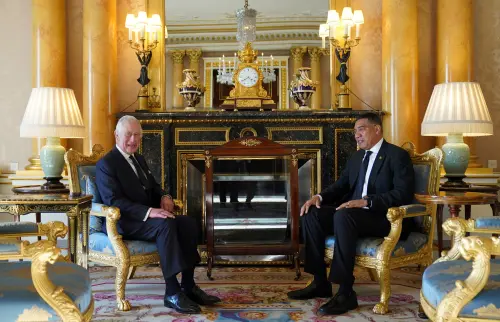In Kingston and London, Jamaicans are pushing for their country to sever ties with King Charles as the head of state. However, a bill introduced by the government to achieve this has frustrated some critics who argue for a more comprehensive approach to cutting colonial connections.
Jamaica, like 13 other former British colonies, gained independence in 1962 but still upholds the British monarch as its head of state. Public sentiment in the Caribbean nation, with nearly 3 million inhabitants, has been evolving. In December, Prime Minister Andrew Holness's administration introduced a bill to eliminate King Charles as the head of state.
The legacy of slavery and colonialism, with hundreds of thousands of enslaved Africans brought to Jamaica during transatlantic slavery, is widely seen as a factor contributing to persistent inequalities. This perspective has been compounded by increasing calls from African and Caribbean nations to address historical injustices.
On the matter of removing the monarchy, British authorities have deferred to the decision-making of local residents and politicians. Prince William, the current heir to the throne, expressed support for Caribbean nations to determine their future during a 2022 visit to the Bahamas.
The proposed Jamaican bill, expected to be debated in parliament soon, would require a referendum for ratification. Ahead of this process, critiques from factions including the opposition People's National Party (PNP) have surfaced regarding the selection and authority of a future president, as well as the designation of Jamaica's final court of appeal.
Advocates for change, such as Steven Golding of the Universal Negro Improvement Association, emphasize the importance of fully severing colonial remnants and avoiding superficial alterations. Strong sentiments against the monarchy have been amplified in Jamaica following Barbados's removal of the Queen as head of state in 2021.
A recent survey showed a majority of Jamaicans supporting the removal of the monarch. The bill proposes the replacement of the current governor general with a president nominated by the prime minister in consultation with the opposition leader, and outlines a process for candidate selection in case of disagreement.
Critics, including former Prime Minister P. J. Patterson, express concerns that the president could be overly influenced by the prime minister, urging for protections against potential manipulation. The government plans to progress the bill through parliament and eventually hold a national referendum, despite challenges related to the selection of the Caribbean Court of Justice and debates over the fate of the Privy Council.
